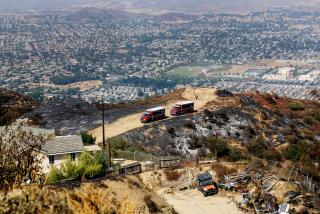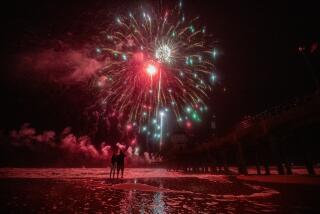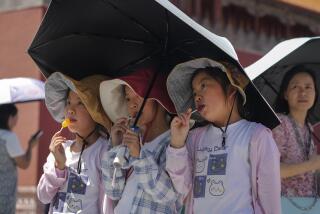Fireworks-sparked blazes jump in China
Reporting from Beijing — The Chinese love of pyrotechnics and the country’s winter drought have proved a combustible combination for Lunar New Year holiday celebrations, which have been ushered in by a wave of mostly small fires.
The Ministry of Public Security on Tuesday reported 11,800 fires nationwide during the weeklong holiday, up from 7,480 the previous year, according to the official New China News Agency. In the parched capital of Beijing alone, there were 194 fires, almost double the number last year.
The hazards are complicated this year by a drought that is also threatening the country’s winter wheat crop. Northern China has seen no major precipitation since October, and state news media have warned that the drought could be the worst since modern record-keeping began in 1951. In addition, the use of flammable insulation material has been blamed for a number of building fires, most lethally in Shanghai, where a fire in November killed at least 58 people in a high-rise apartment building.
“The drought, the fireworks, the shoddy building materials — this is a bad combination,” said Ma Jun, a prominent Chinese environmentalist. “We need to change that.”
This year’s tragedies might be the impetus for change. Six firefighters died Saturday night battling a forest blaze in Zhejiang province that authorities believe was started by fireworks. Fireworks are also suspected in a blaze that heavily damaged a 1,000-year-old temple Monday morning in the eastern city of Fuzhou. In the northeastern city of Shenyang, a five-star hotel in the tallest real estate complex there was gutted after fireworks ignited in a parking lot landed on a roof.
Not including the fire in Shenyang, damage from all the fires was estimated at $8.5 million, double the amount last year.
The Chinese government runs frequent, well-publicized campaigns against unlicensed fireworks.
Authorities have tried periodically to banish fireworks from the cities. But the right to ignite one’s own private stash is cherished as sacred by many Chinese, whose folklore has it that the loud bangs scare off evil spirits. A 12-year ban on fireworks in the capital was lifted in 2006.
Beijing settles for restricting the size of the fireworks that can be used in the inner city and inspecting some vehicles coming from the outskirts for contraband. The government has not reinstituted the ban despite a dramatic 2009 fire that destroyed part of a Rem Koolhaas-designed architectural showpiece that was supposed to be the headquarters of CCTV, China’s main propaganda organ.
Temporary kiosks operating under government supervision are fixtures on street corners every Chinese New Year, when fireworks are legally offered for sale in the cities.
“For sure, the weather is very dry and that creates a problem,” said Wang Liying, the manager of a kiosk filled with shiny, red packages of combustibles in Tongzhou, a Beijing suburb.
Wang’s employees were handing out fliers with safety instructions: Don’t ignite fireworks or firecrackers near gas stations, cultural heritage sites, in forests, on rooftops or balconies. But she insisted that her wares were safe.
“See these sparklers; a 3-year-old can light them,” she said.
Across the street, a group of men unleashing a fountain of green light from a Roman candle acknowledged that there were some frightening aspects to pyrotechnics. “It’s true that the fireworks are dangerous,” said 38-year-old Ye Yun. “But what would New Year be without fireworks? For us Chinese, this is a tradition that is in our blood for a thousand years.”
Tommy Yang of The Times’ Beijing Bureau contributed to this report.
More to Read
Sign up for Essential California
The most important California stories and recommendations in your inbox every morning.
You may occasionally receive promotional content from the Los Angeles Times.










